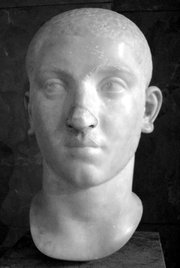Alexander Severus
|
|
Marcus Aurelius Severus Alexandrus (October 1, 208- March 18?, 235), commonly called Alexander Severus, Roman emperor from AD 222 to 235, was born at Arca Caesarea in Palestine.
His father, Gessius Marcianus, held office more than once as an imperial procurator; his mother, Julia Mamaea, was the daughter of Julia Maesa and the aunt of Elagabalus (also called "Heliogabalus"). His original name was Bassianus, but he changed it in 221 when his grandmother, Maesa, persuaded the emperor Elagabalus to adopt his cousin as successor and create him Caesar. In the next year, on March 11, Elagabalus was murdered, and Alexander was proclaimed emperor by the Praetorians and accepted by the senate.
He was then a mere lad, amiable, well-meaning, but entirely under the dominion of his mother, a woman of many virtues, who surrounded him with wise counsellors, watched over the development of his character and improved the tone of the administration, but on the other hand was inordinately jealous, and alienated the army by extreme parsimony, while neither she nor her son had a strong enough hand to keep tight the reins of military discipline. Mutinies became frequent in all parts of the empire; to one of them the life of the jurist and praetorian praefect Ulpian was sacrificed; another compelled the retirement of Dio Cassius from his command.
On the whole, however, the reign of Alexander was prosperous till he was summoned to the East to face the new power of the Sassanians. Of the war that followed we have very various accounts; Mommsen leans to that which is least favourable to the Romans. According to Alexander's own dispatch to the senate he gained great victories. At all events, though the Persians were checked for the time, the conduct of the Roman army showed an extraordinary lack of discipline. The emperor returned to Rome and celebrated a triumph (233), but next year he was called to face German invaders in Gaul, not far from Mainz, where he was slain, (on either March 18 or 19 235), together with his mother, in a mutiny of the Legio XXII Primigenia which was probably led by Maximinus Thrax, a Thracian legionary, and at any rate secured him the throne.
Alexander was the last of the Syrian emperors. During his reign, acting, as he did in most things, under the influence of his mother, he did much to improve the morals and condition of the people. His advisers were men like the famous jurist Ulpian, the historian Dio Cassius and a select board of sixteen senators; a municipal council of fourteen assisted the urban praefect in administering the affairs of the fourteen districts of Rome. The luxury and extravagance that had formerly been so prevalent at the court were put down; the standard of the coinage was raised; taxes were lightened; literature, art and science were encouraged; the lot of the soldiers was improved; and, for the convenience of the people, loan offices were instituted for lending money at a moderate rate of interest.
In religious matters Alexander preserved an open mind. In his private chapel he had busts of Orpheus, Abraham, Apollonius of Tyana, and Jesus. It is said that he was desirous of erecting a temple to the founder of Christianity, but was dissuaded by the pagan priests. There is no doubt that, had Alexander's many excellent qualities been supported by the energy and strength of will necessary for the government of a military empire, he would have been one of the greatest of the Roman emperors.
See Lampridius, Alexander Severus; Dio Cassius lxxviii. 30, lxxix. 17, lxxx. 1; Herodian vi. 1-18; Porrath, Der Kaiser Alex. Sev. (1876); Pauly-Wissowa, Realencyclopadie, ii. 2526 foll. (Groebe); monograph by RV Nind Hopkins, Cambridge Historical Essays, No. xiv. (1907).
External link
- Life of Alexander Severus (http://penelope.uchicago.edu/Thayer/E/Roman/Texts/Historia_Augusta/Severus_Alexander/1*.html) (Historia Augusta at LacusCurtius: Latin text and English translation)
See also: Severan dynasty family tree

